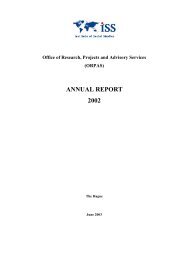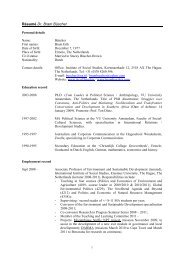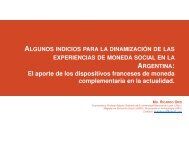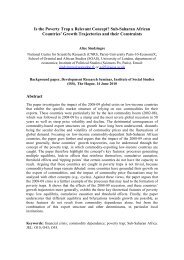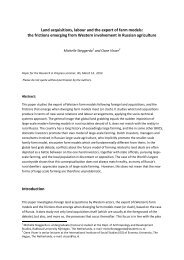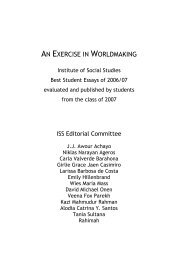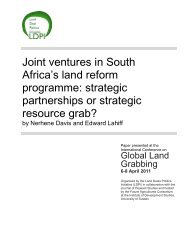AN EXERCISE IN WORLDMAKING 2009 - ISS
AN EXERCISE IN WORLDMAKING 2009 - ISS
AN EXERCISE IN WORLDMAKING 2009 - ISS
Create successful ePaper yourself
Turn your PDF publications into a flip-book with our unique Google optimized e-Paper software.
138 STEF<strong>AN</strong>IA DONZELLI<br />
sense of guilt for having “invited” the perpetrator in some way or another;<br />
they may blame themselves for a “too passive” reaction; they may<br />
feel ashamed and face societal reproach for a “too free” conduct; they<br />
may lose confidence in themselves or trust in human relationships and so<br />
on.<br />
Whatever forms of violence a survivor may face, I assume that s/he<br />
will pass through a process of reflection to make sense of the violence<br />
experienced, both in the rape event and in the following and likely victimization.<br />
Moreover, I am inclined to think that, in this process of making<br />
sense of violence, a person may be influenced by her/his own dynamic<br />
understanding of the world. Thus, being aware of the working of<br />
gender power relations and of their intersection with other social relations<br />
of power based on sexual orientation, ethnicity, class, age, etc., may<br />
influence survivors’ understanding of the world, and hence, their reactions<br />
to the process of victimization. More specifically, assuming that the<br />
notion of power is related to one of responsibility, acknowledging social<br />
relations may contribute to emancipate survivors from their condition of<br />
victimization, clarifying them what has and what has not been their responsibility<br />
in the deploying of violence, what might be their future possibilities<br />
to take decisions and what they might face in relation to their<br />
decisions.<br />
Finally, I consider that human beings understand the world through<br />
discourses and representations: language, in fact, operates as a representational<br />
system through which meanings are constructed and exchanged.<br />
In other words, it is through language that we make sense of the environment<br />
around us. Beside this, recognizing that the construction of<br />
meanings is not fixed and steady makes possible to change discourses<br />
and representations (Hall, 1997: 1-11). In relation to these reflections I<br />
believe that making visible, through discourses and representations, the<br />
operating of social power relations in daily life may have a practical implication<br />
for survivors’ emancipation.<br />
Research Problem<br />
The present research is concerned with the analysis of the politics of representation<br />
of sexual violence promoted by feminist organizations working<br />
with media and communication that make visible the working of social<br />
relations of power in daily life. More specifically, this investigation<br />
will analyse the politics of representation of rape/victimization of a




